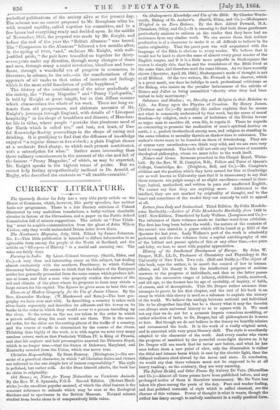History of the Intellectual Development of Europe. By John W.
Draper, M.D., LL.D., Professor of Chemistry and Physiology in the University of New York. Two vols. (Bell and Daldy.)—The object of this book, says the author, is to assert the control of law in human affairs, and his theory is that the intellectual progress of nations. answers to the progress of individuals, and that as the latter passes. through the successive stages of infancy, childhood, youth, manhood, and old age, so the former has its age of credulity, of inquiry, of faith,. of reason, and of decrepitude. This Dr. Draper rather assumes than attempts to prove in his first chapter, and the rest of his book is am essay in which this theory is used as a talisman to explain the history of the world. We believe the analogy between national and individual life to be altogether fanciful, but be a theory what it may the theorist can always state universal history so as to square with it. We need not say that we do not for a moment impute conscious moulding, or. rather selection of facts, to Dr. Draper, but all philosophers do it more or less. But though we do not believe in the theory we heartily admire and recommend the book. It is the work of a really original mind, and is executed with very great literary skill. The style is excellently adapted to the character of the work. And every reader who views. the progress of mankind by the powerful cross-light thrown on it by Dr. Draper will see much that he never saw before, and what he has seen before from a new point of view, only the illustration is rather the fitful and intense beam which is cast by the electric light, than the diffused radiance shed abroad by the moon and stars. In conclusion, we would say that these volumes must not be supposed to be at all heavy reading ; on the contrary, they are very amusing.






























 Previous page
Previous page